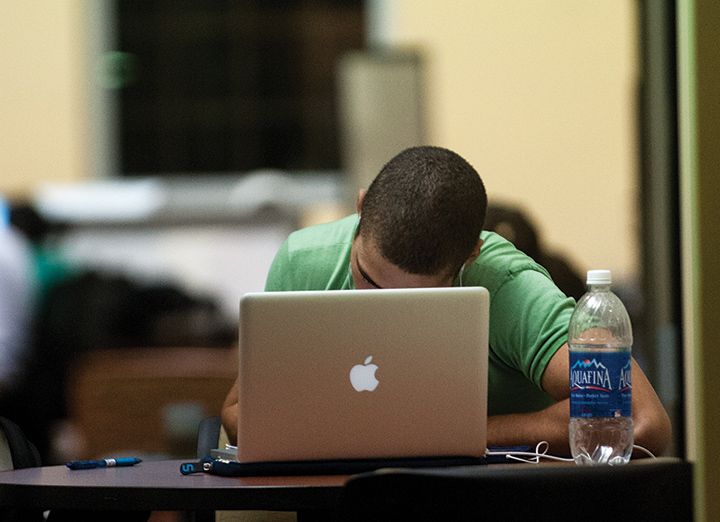Views expressed in opinion columns are the author’s own.
Happy end-of-syllabus week, everyone! Now that the week is over, we know which of our classes we’ll be allowed to sneak a peek at our phones in, which ones we can type notes in and which ones have vehemently banned any use of laptops and electronics. That last type is becoming more and more common, as research repeatedly shows that handwriting notes in class is better for students’ memory retention and ability to stay focused.
While I won’t deny the benefits and clear advantages of handwriting notes, there are definitely disadvantages and stressful challenges that come with leaving laptops behind.
Oftentimes, professors speak very quickly or flip through slides like something’s chasing their Powerpoint. Though handwriting notes pushes students to pick out the most important pieces of information or write down more general ideas, doing so usually means that examples, explanations and even key details don’t get written down. We can only remember so much of a professor’s verbalized block of knowledge.
If exams tended to focus on broader concepts and tested students’ understanding of important themes, then this approach would be fine. However, because exams — particularly in larger, lecture-style classes — test students on very specific details and facts, this whole processing-some-but-not-all information thing doesn’t work out so well.
Handwriting notes does allow for deeper understanding and comprehension, but that only goes for the information students are able to process and remember long enough to write down, which ultimately can backfire on them when taking in-depth exams. Either professors should let laptops into the classroom, or they should ensure that exams match the content that students are able to record in class.
There are cases in which professors upload their slides or Panopto recordings, which can provide students with another chance to take notes on anything they missed. However, students do not have the time to essentially take the same class twice to take notes. Panopto recordings are infinitely useful when someone is sick or maybe zoned out of class, but they shouldn’t function as manageable replacements for lectures because the live one was impossible to keep up with.
I’m not just being dramatic. Last fall, I took a course where the professor sped through slides so quickly that most students forewent taking notes in class completely. Instead, students essentially wasted more than an hour to show up to the class for participation points, then would go home and watch the recording to actually be able to take helpful notes.
The way professors wield slides can also make a major difference. Professors who post their slides before lectures are a gift to students everywhere. Doing so allows students to not have to worry about stuff that’s usually on the slide (extended definitions and such) and lets them take notes on what the professor is saying while in class.
Then there are professors who champion sparse slides with a few key words and little else. While that may be a great way for the professor to remember their talking points, it doesn’t really help the student who then has to keep up with the professor’s verbal definitions, examples and explanations.
Honestly, I’d like to handwrite all of my notes. It’s just that typing has allowed me to simply record more information, which has ultimately only helped when taking exams. Still, the research in favor of handwriting notes is too overwhelming to reject. The push for handwriting notes shouldn’t go away, but the technology and pacing of lectures should then match the technology and pacing of handwriting, not laptops.
To refute the laptop advantage, professors may consider slowing down, creating exams that match the information that students are able to write by hand, posting slides with relevant and helpful material beforehand or just asking students how they’re doing with note-taking. Still, given that most students type faster than they write, using laptops may allow them to keep up with speedy slide-switchers, chunks of lecture packed full of important information and minimalist presentations.
Jasmine Baten is a junior English major. She can be reached at jasminebaten137@gmail.com.



